When autumn delivers its bounty of fruitfulness, it also sends us a mountain of leaves and the need for garden vacuums, leaf blowers, and the quick work of the best lawn mowers to tidy up the mound. While many have fabulous colourful tints and look magnificent carpeting the ground, even these turn into a stodgy mess in time.
Not only do lots of decomposing leaves look unattractive, but also, they encourage plants to start rotting, too – including the lawn grass underneath them. This is why investing in a leaf blower is well worth it and good for your lawn. These tools can also prove their worth in wintery weather, helping you shift snow from cars and outdoor areas.
Best leaf blowers at a glance:
• Best overall leaf blower: Mountfield MBL 50LI Cordless Blower - View on Amazon UK
• Best battery-powered leaf blower: EGO LB5800E Power+ 56V Cordless Leaf Blower - View on Just Lawnmowers
• Best leaf blower for hard surfaces: Kärcher LBL 2 Cordless Battery Leaf Blower with Battery - View on Amazon UK
Leaves can be a slip hazard on paths and other hard surfaces and make a cosy hiding place for slugs and their progeny. So, once your foliage display is over and you're ready to get the lawn mower out of the shed, it’s best to clear them away to a leaf mould bin where, in time, they’ll turn into a useful soil improver.
Even in reasonably small gardens, raking is a time-consuming chore, which is where a leaf blower or garden vacuum can be a godsend. In this guide, we've rounded up the best leaf blowers on the market, from corded blowers that will need to be plugged into a power source to battery-powered options that enable you to go cable-free.
The best leaf blowers every gardener needs in their shed
Best overall leaf blower
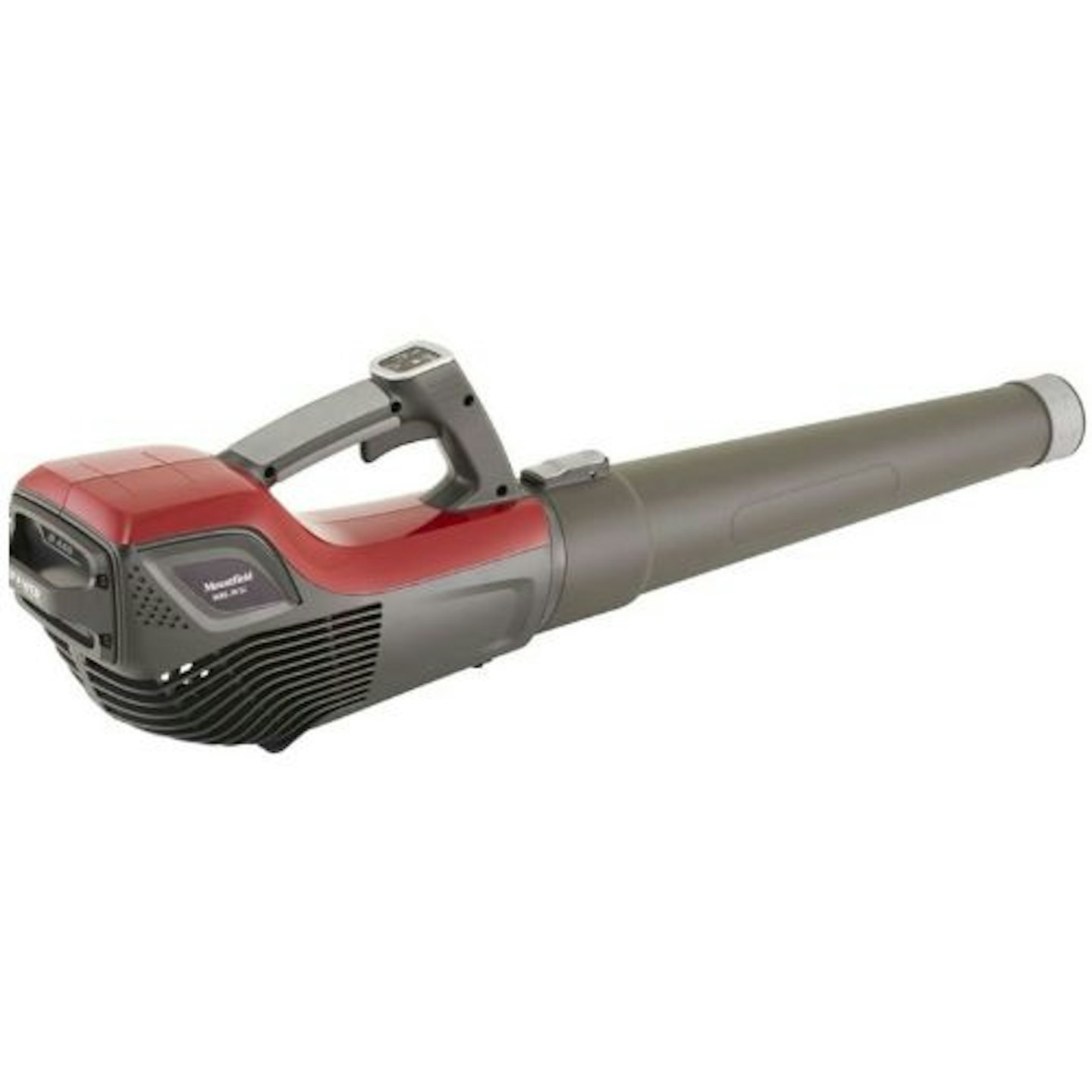 Mountfield
MountfieldJust as powerful as a petrol-operated machine, the cordless Mountfield blower is extremely energy efficient, lightweight, and easy to operate. It performs well on grass, paths and patios with the 48V Lithium-Ion battery effortlessly powering the 650w brushless motor for swift removal of leaves to leave your outdoor space looking spotless. And with 130 minutes of running time, there's no worry your blower will cut out while you're still working.
Other features also include a quick-release button, an electronic control panel with LEDs, plus an on/off switch for full safe use, and a detachable blowing tube for space-saving storage. Do note though, this product is supplied without battery and charger, so you will need to purchase these separately.
Pros
- Lightweight but still offers a long battery life
- Reviewers appreciate the adjustable speeds
Cons
- Need to buy battery separately
| Power source: | Battery 2Ah-4ah |
| Airflow speed: | 198kph |
| Power: | 48V |
Best battery-powered leaf blower
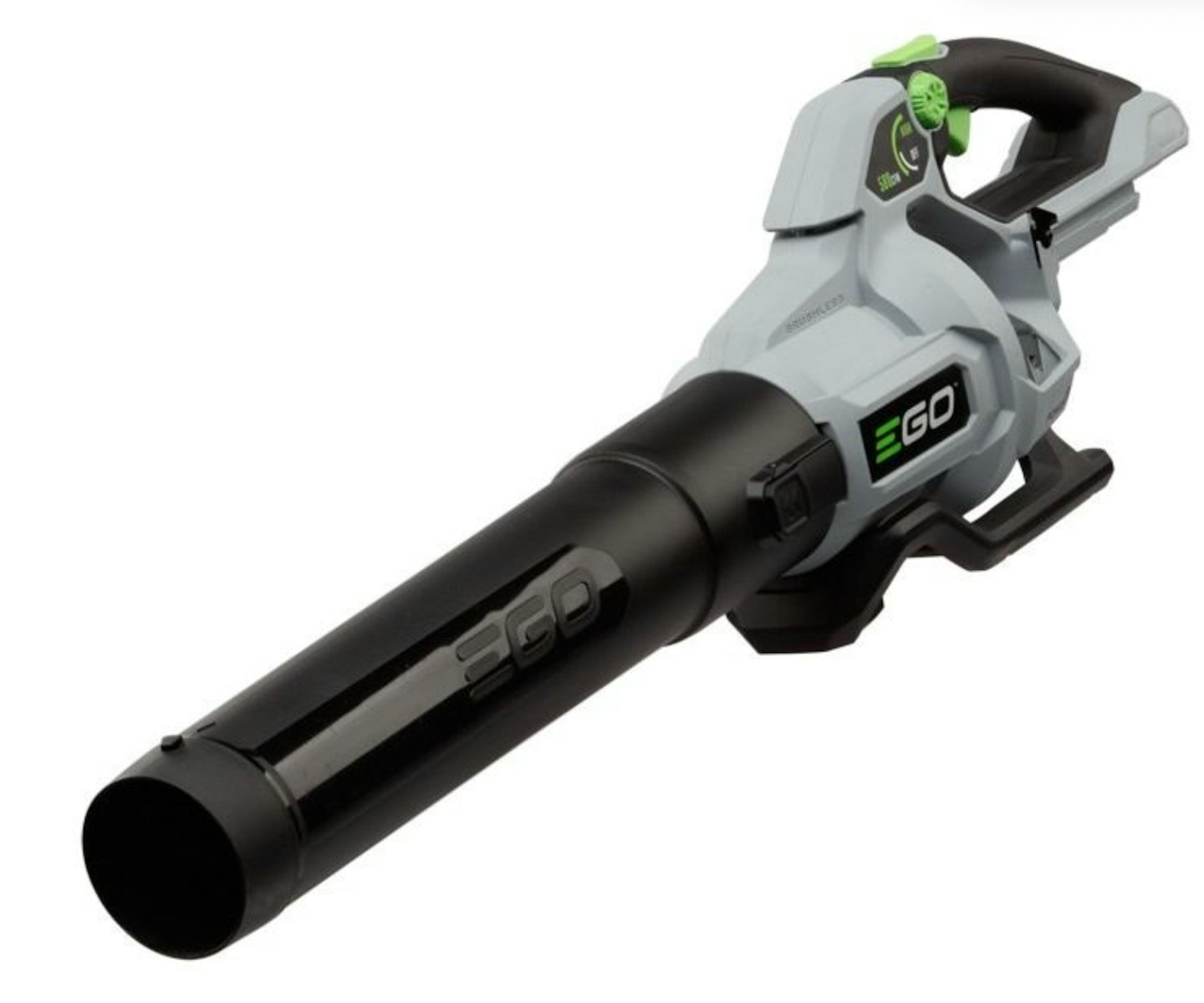 EGO
EGOwww.justlawnmowers.co.uk
This EGO Power+ leaf blower is stiff competition for popular brands like Ryobi and Stihl, it has variable speed and different battery options to aid performance. It will make quick work of your chores and is cordless, so you can comfortably walk around your garden and get to those hard-to-reach spots without making adjustments.
The variable speed thumb selector gives added airflow control with single-handed use, generating more than 986 cubic metres of air volume in high mode. The large-diameter blower tube delivers maximum airflow. It performs better than many premium petrol-powered models and runs on the industry’s most powerful battery, the first-ever 56-volt lithium-ion battery with 40 per cent more power than the leading 40-volt battery. Please note: This product is supplied without battery and charger, so you will need to purchase these separately.
Pros
- Variable power helps the battery perform better
- Compatible with the first-ever 56-volt lithium-ion battery
Cons
- Using the turbo button consumes energy faster
| Power source: | Battery 2-7.5Ah |
| Airflow speed: | Variable |
| Power: | 56V |
Best leaf blower for hard surfaces
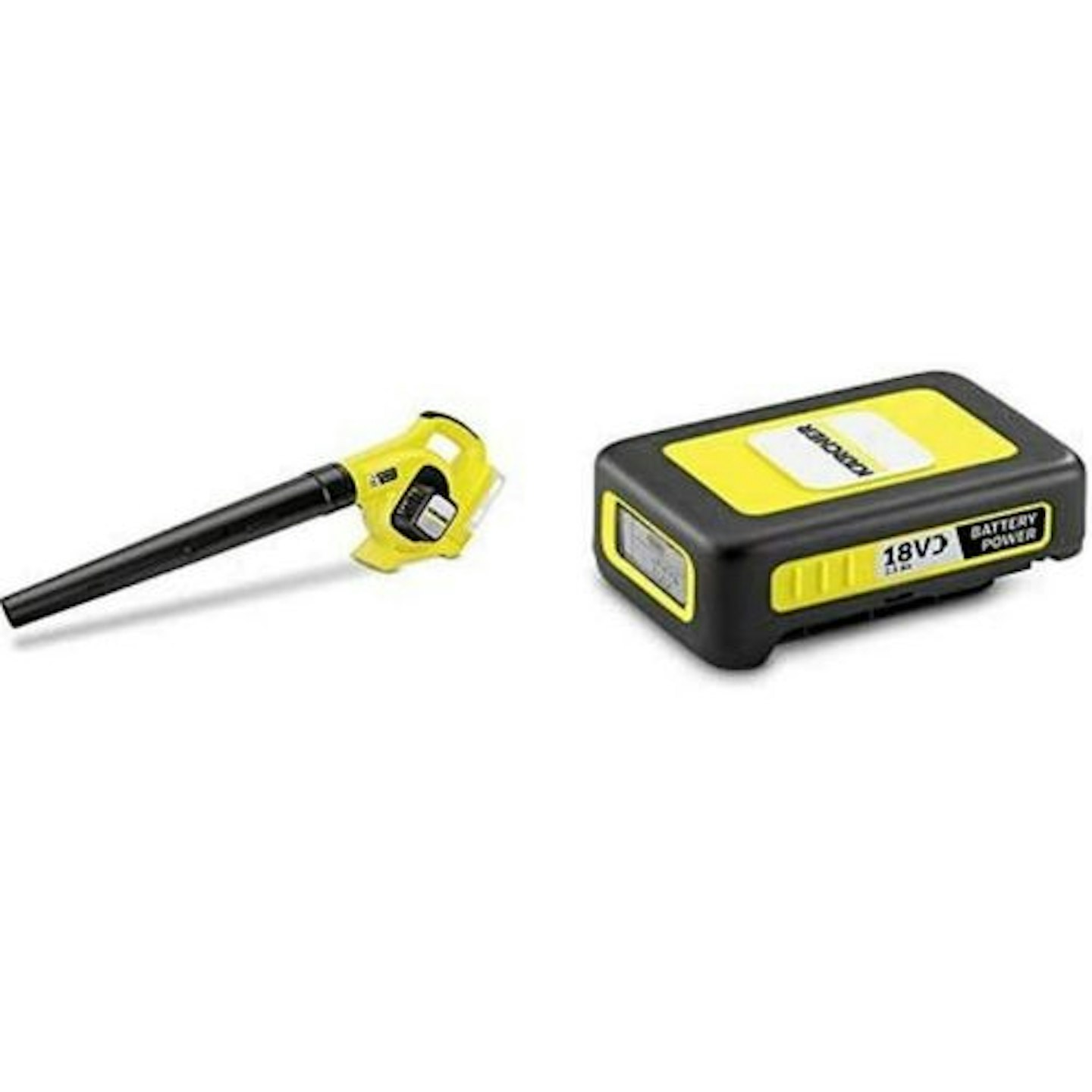 Karcher
KarcherThis lightweight leaf blower has an ergonomic design that sits comfortably in your hand for convenient, non-stop use. It blows leaves at 210km per hour, and a detachable flat nozzle means you can move leaves in a controlled and targeted manner. However, the power is limited and some customers report that it works better on hard surfaces to shift leaves and debris as opposed to on the lawn, so bear that in mind.
This uses the same 18V batteries as the entire Kärcher range, so it's a tempting choice if you've already bought into the system. The handy integrated LCD display shows remaining running time, remaining charging time, and charging status.
Pros
- LCD display monitors battery usage
- Battery compatible across Kärcher products
Cons
- Some reviewers say this has limited power
| Power source: | Battery 2.5Ah |
| Airflow speed: | 210kph |
| Power: | 18V |
Best for ease of use
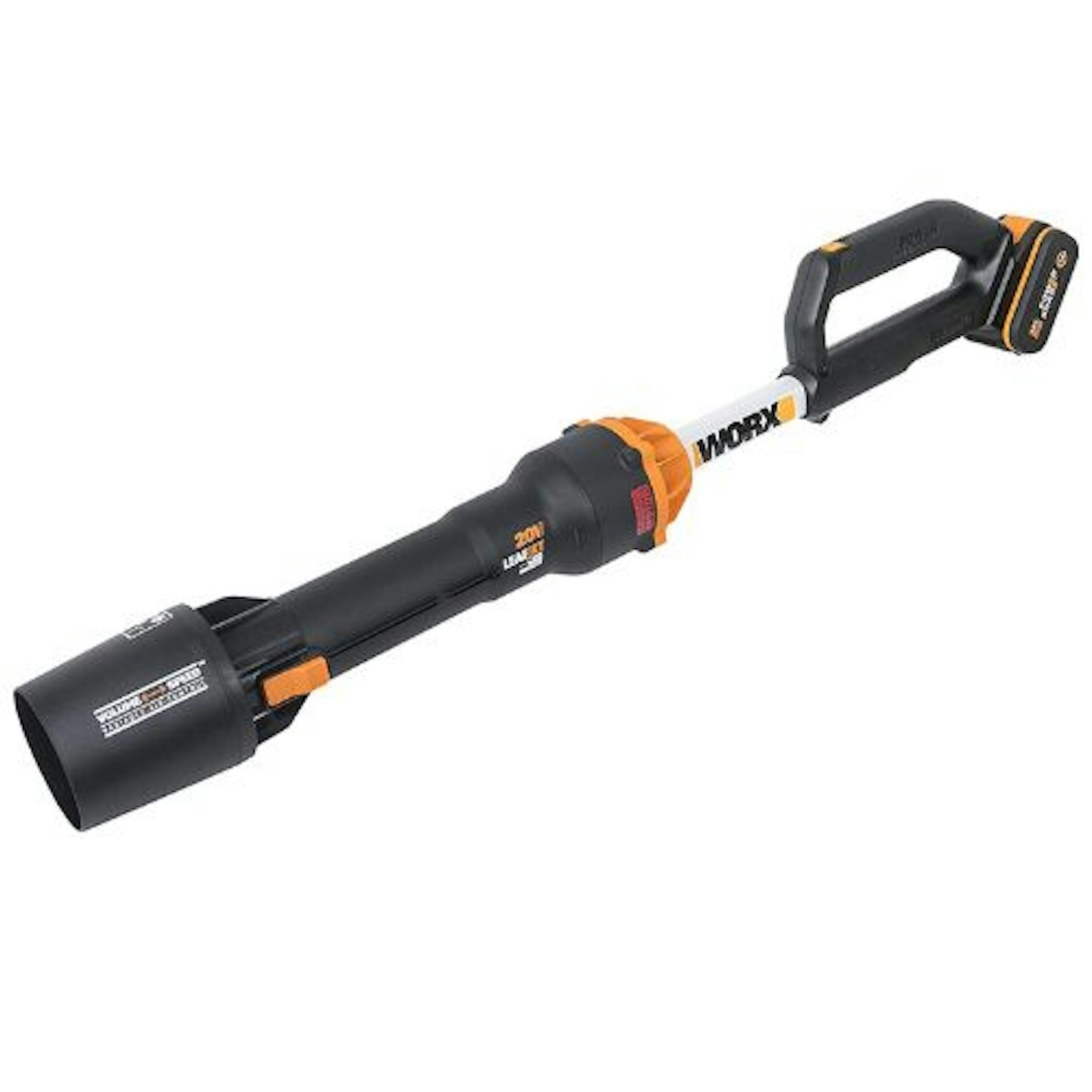 Worx
Worxwww.homebase.co.uk
Using a 20v Powershare battery which you can use across the Worx garden and construction tool range, the Worx WG543E Cordless Leaf Blower can effectively clear leaves from your garden. It proves light and easy to handle, with a conveniently placed switch to dial up one of two power levels. The lower setting can still shift lighter leaves on the lawn very effectively, although you’ll want to flick it into the top setting to clear more stubborn leaves stuck in flower beds.
Read our full Worx WG543E leaf blower review in which we compare it to the Worx WG583W Brushless leaf blower/ vacuum.
Our review: "If you’re just interested in blowing leaves off your path, patio, or property, we’d stick with the Leafjet. Its lighter weight and lower price more than make up for its surprisingly modest power deficit, and the money you save can be spent on a couple of batteries to help make up for the meagre run time."
Pros
- Light and easy to handle in small areas
- Conveniently placed switch to change power levels
Cons
- Battery run time is short - we would recommend buying extra batteries
| Power source: | 4.0ah Battery with 2A Charger |
| Airflow speed: | Up to 209km/h |
| Power: | 20V |
Best cordless leaf blower
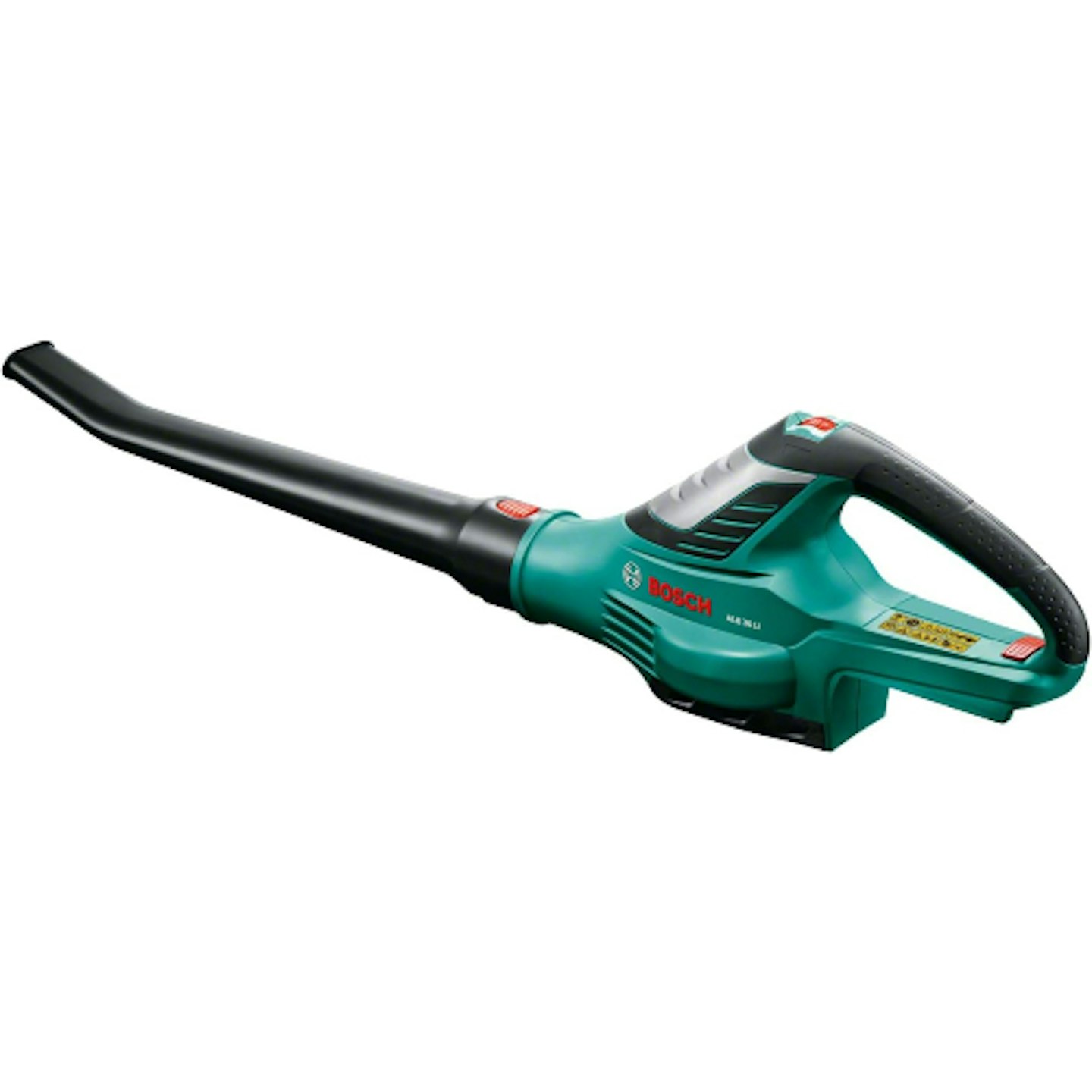 Bosch
BoschA lightweight, fast and efficient leaf blower with a 20-minute run time that will round up those leaves in a smaller garden without trouble. You will be safely guided by an optimal balance and ergonomic design, and thanks to the good weight distribution and the soft grip surface, the leaf blower will sit comfortably in the hand, protecting your arms and legs.
At just over £100, this does require you to invest separately in the battery, but this is compatible across all Bosch's home and garden range, so if you already have a battery, you can opt to buy just the tool. In addition, the removable blower tube allows you to store the cordless leaf blower to save space.
Pros
- Start-up safety feature
- Bosch 'Power For All' battery compatible
Cons
- Not powerful enough for larger gardens
| Power source: | Battery 2.5Ah |
| Airflow speed: | 210kph |
| Power: | 18V |
Best quiet leaf blower
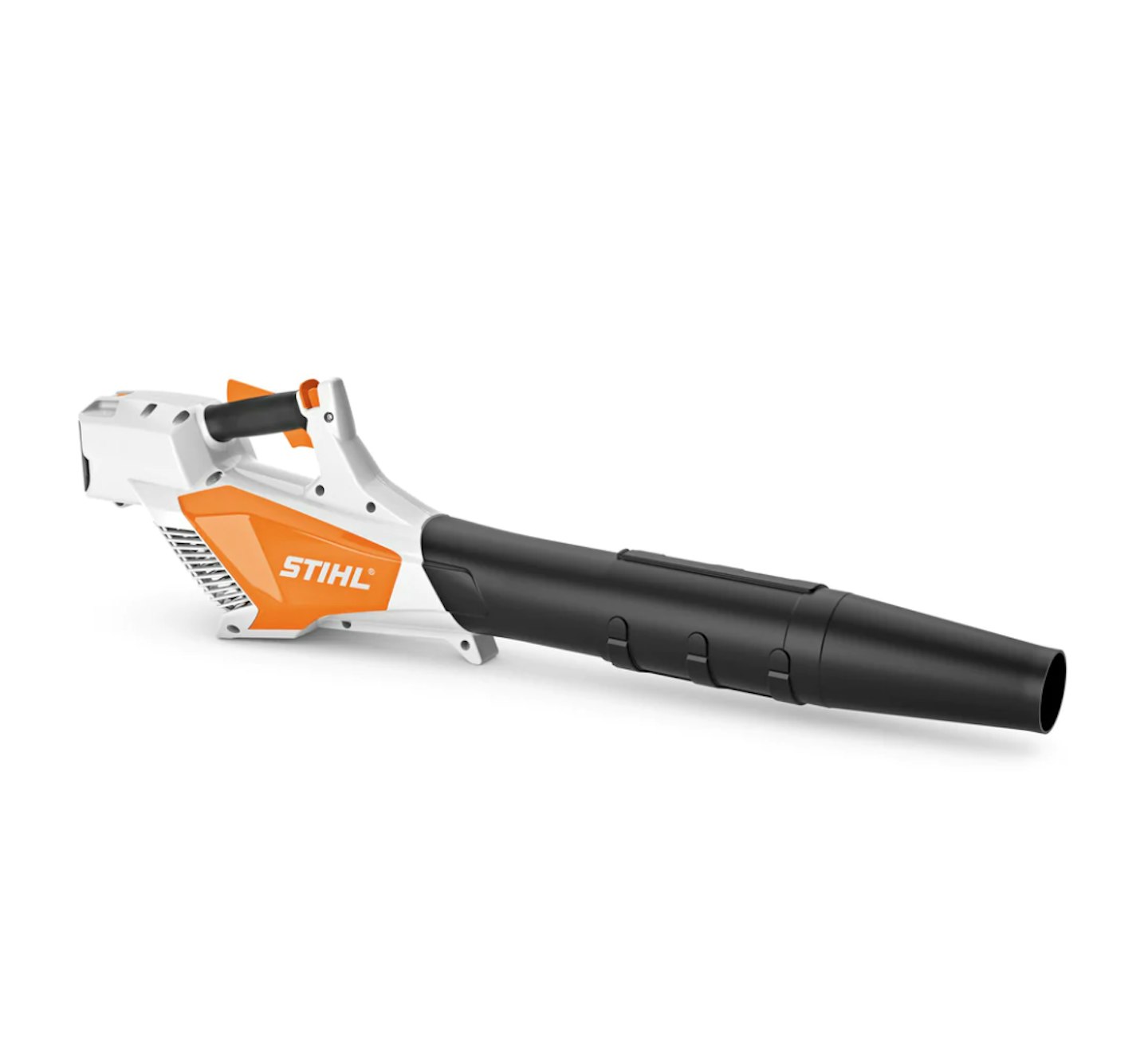 Stihl
StihlThe key thing to note about this Stihl BGA 57 leaf blower is that it is extremely quiet, so quiet that you won't need ear protectors when in use, making it safer to use - and meaning you won't annoy the neighbours. The adjustable blower tube means you can extend the length to find the perfect working height for ultimate comfort.
The battery is quick to charge, with a run time of 20 minutes, but there is a spare charger included in this package, so if you run out while still tidying, a quick switchover will save plenty of time. The blowing force of the Stihl BGA 57 is surprisingly powerful, given its lightweight feel and is perfectly suited to clearing leaves, twigs and debris. Reviewers confirm this is quiet, yet extremely powerful.
Pros
- Comes complete with two rechargable batteries
- Adjustable blower tube for ideal working height
Cons
- Reviewers say the battery can be stiff to remove
| Power source: | Battery 2Ah (x2) |
| Airflow speed: | 198kph |
| Power: | 36V |
Best corded leaf blower
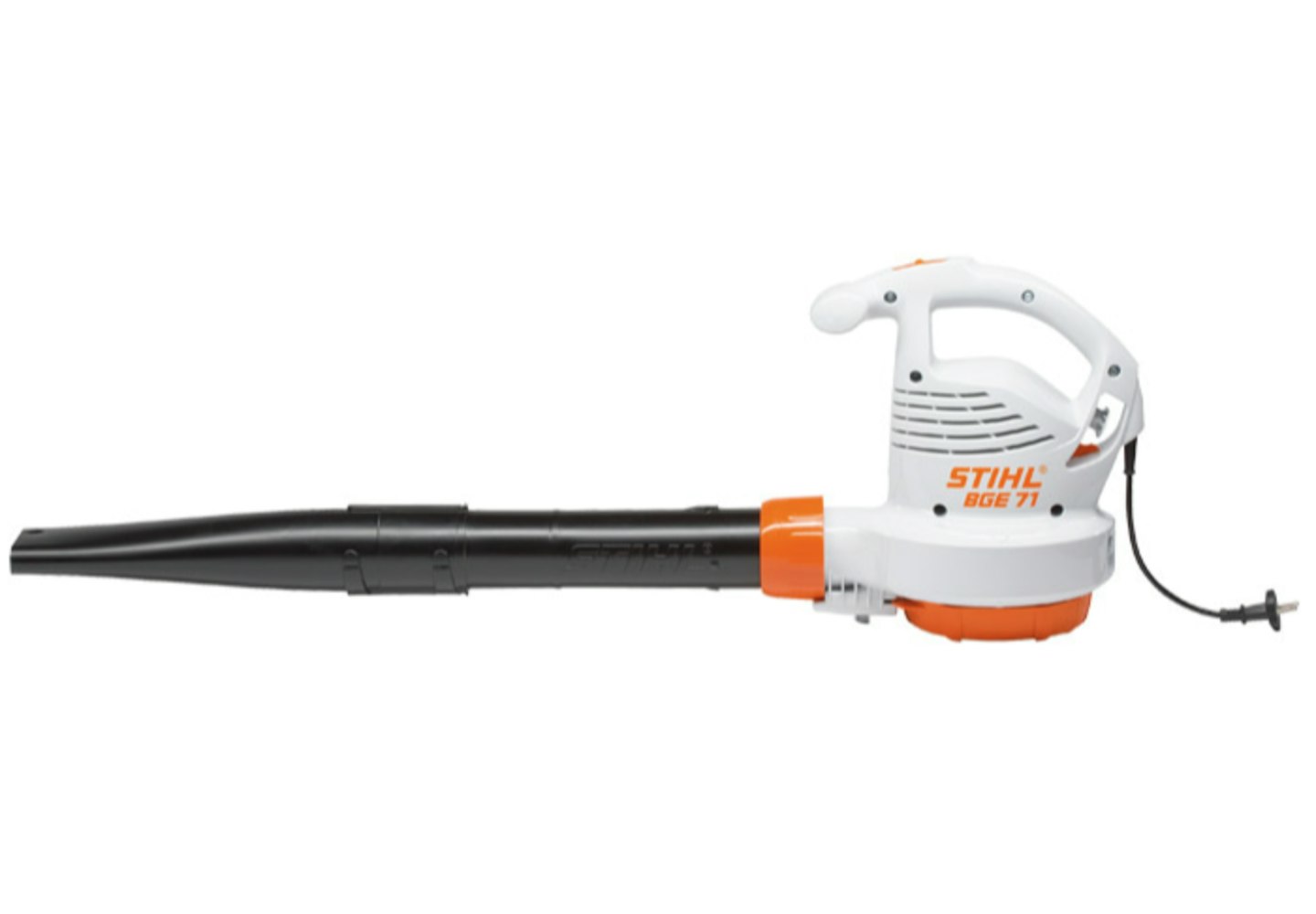 Stihl
Stihl As one of the corded options on our list, the Stihl BGE 71 is considerably cheaper than bigger brand names without the need for a separate battery pack and charger. However, you will be restricted depending on where your mains power outlet is and will require an extra extension lead for anything over five metres.
Another additional feature of this Stihl corded blower is when it is combined with the practical vacuum adaptor kit, the blower unit can be converted into a vacuum unit with a catcher bag for compressing large volumes of waste.
Pros
- Can buy an additional vacuum bag
- Great budget choice for medium size gardens
Cons
- Extension lead needed for over five metres
| Power source: | Mains corded |
| Airflow speed: | 237kph |
| Power: | 1.1kW |
Best budget leaf blower and vacuum
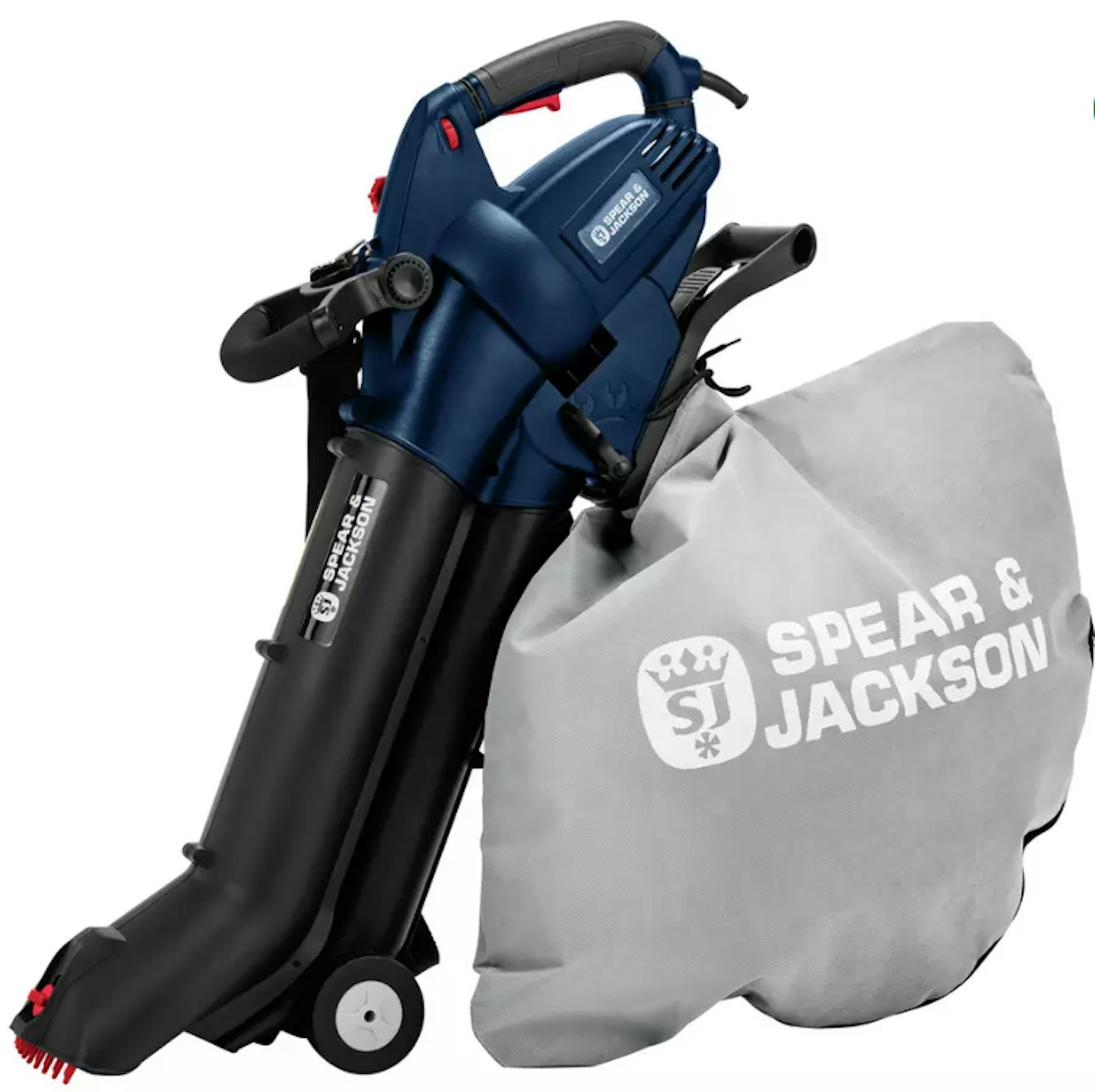 Spear and Jackson
Spear and Jacksonwww.argos.co.uk
This may be a corded option but with an extra long 10 metre cable it reduces the need for an extension lead, with no extra worries about reaching the opposite end of your garden. It is a chunky piece of equipment so allow the strong sturdy wheels to take the strain along with the additional shoulder strap. The wheels will give you more support with the weight but may take some getting used to.
Priced well under £100, the Spear & Jackson 3000W Blower Vac doesn't have many extra bells and whistles but does have a mulch/shred action that will compress the leaves and debris, something reviewers report being impressed with.
Pros
- Also has a shredder/mulcher option
- Wheels and shoulder strap come in handy
Cons
- Clunky to use
| Power source: | Mains corded |
| Airflow speed: | 300kph |
| Power: | 3kW |
| Collection bag: | 45L |
Best leaf blower vacuum for artificial lawn
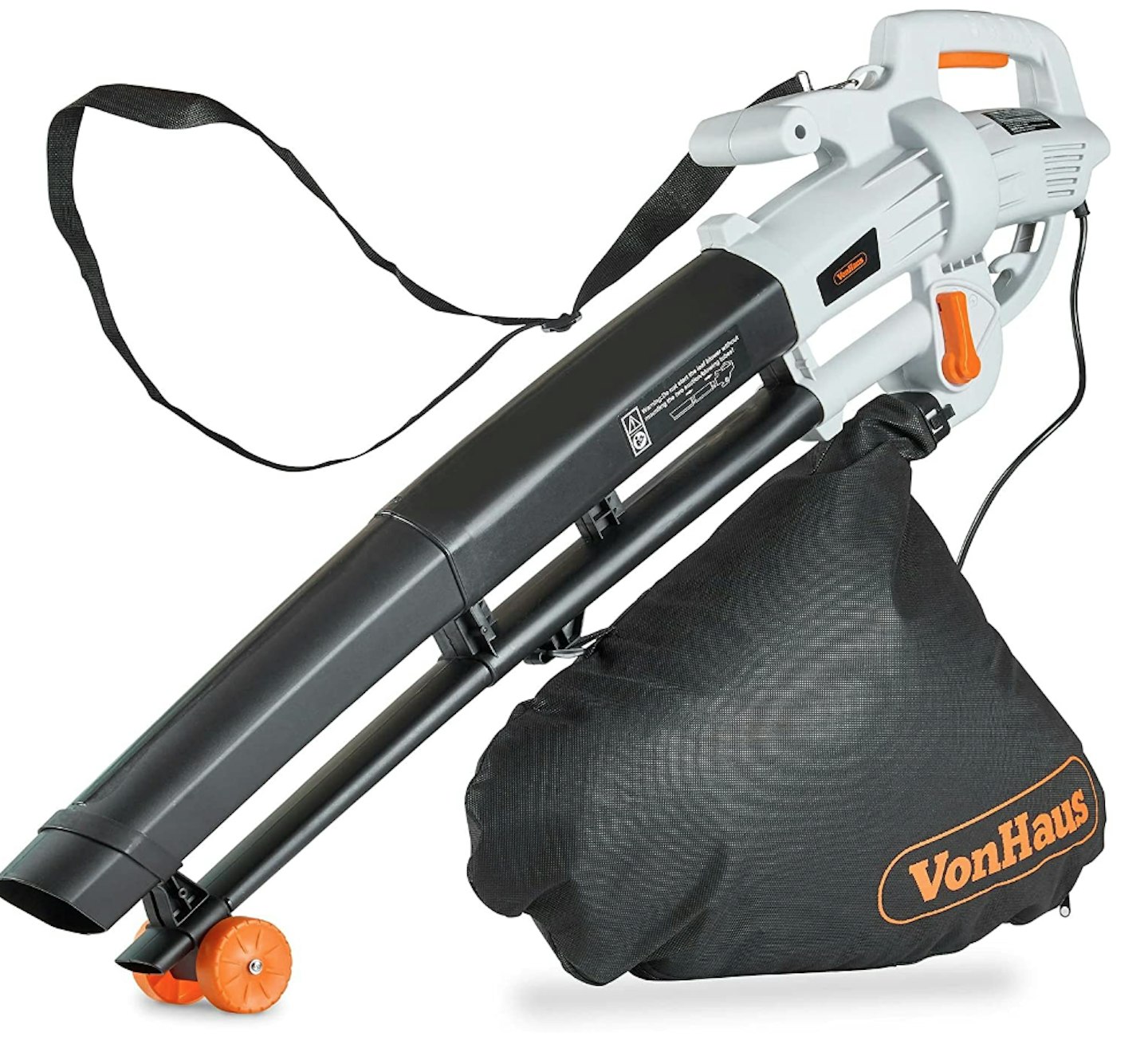 VonHaus
VonHaus www.vonhaus.com
This highly-rated garden vacuum from VonHaus is lightweight, affordable and powerful. With a 3000W motor, this vacuum will make your garden clean-up a breeze. It has a 35-litre collection bag with a shredding ratio of 10:1, so it won't take you long to empty the bag and save you multiple trips to empty it.
Compact and lightweight, this Leaf Blower has been designed with comfort in mind. This features wheels and a shoulder strap to reduce strain on your shoulders, arms and back. The design allows you to work for prolonged periods without any signs of fatigue. One reviewer reports using this tool to clear their entire artificial lawn of debris with little effort.
Pros
- 35-litre collection bag for less emptying
- Wheels and a shoulder strap for comfortable use
Cons
- Collection bag can get heavy
| Power source: | Mains corded |
| Power: | 3000W |
| Collection bag: | 35L |
How we chose the best leaf blowers
All of these leaf blowers have been hand-selected by our team of Modern Gardens shopping experts. We carefully considered the power and power source, user-friendly features, and airflow speed in our selection of the best. Our team has spent hours investigating and researching leaf blowers to make it easier for you to find the very best, and we'd never recommend a product we don't believe in.
Where possible, we also test and share the latest and best products you should know about. And with help from Modern Gardens Magazine, Garden News and Garden Answers, we share expert gardening knowledge to help you get the most from your product
What to look for when buying a leaf blower
We are confident recommending all the brands we've featured in this buyer's guide; they are all reputable and many offer decent guarantees on their products. These are some important points to consider when you're narrowing down your leaf blower selection:
Adjustable tube length: Adjust this to suit your height. This avoids losing suction/blowing power when the device is held too far off the ground
Variable airspeed/control: Multiple speeds allow you to increase the force for moving stubborn leaves or decrease it around fragile plants. Some machines refer to this as a turbo or power boost
Nozzle shape: Round nozzles are good for moving bulky leaves quickly; flatter ones suit harder-to-move items, such as stuck-on leaves
Shredding ratio: This measures how much the original leaf volume is reduced when it passes through the internal shredding impellors
Vac collection bag: Larger bags need emptying less but become heavier on the shoulder as they fill. Zipped bags are easier to empty
Vac tube support wheel: Reduces carrying weight and holds the nozzle at the right height for maximum suction
Leaf blowers: Power v weight
Petrol-driven machines are generally the most powerful and allow you to roam free, unrestricted by power cables, but they’re not necessary in a small garden. They can be noisy, create polluting emissions, and the engine needs regular maintenance. Those powered by mains electricity don’t offer the same walk-around freedom but are more economical to buy and run, don’t produce emissions, tend to be quieter, need less maintenance and are lighter to carry, making them ideal for seniors and anyone who would struggle to manage an unwieldy garden tool.
Battery-powered machines are similar in many respects, without the trailing cable trip hazard. Lithium-ion batteries provide great performance, which doesn’t diminish and suffer as the battery loses its charge. Remember that a battery may need frequent recharging if you use the machine a lot, or you could buy a second battery to swap with while recharging. The Ah (ampere/hour) rating shows how much energy it stores – the larger the number, the longer it runs.
Many manufacturers make batteries that can be interchanged with other powered tools in their range, so you may be able to buy the machine on its own or as a kit that includes the battery and charger. The former cuts the cost, as you only need one battery and one charger to power different tools.
Leaf blower FAQs
What is the difference between a leaf blower and a garden vacuum?
On a surface level, both gardening power tools seem to have a similar purpose. However, there are slight variations in modes and features - such as if your primary goal is to remove leaves in an average-sized garden, then a garden vacuum would be more suitable. However, a leaf blower would be more fitting if you have a larger garden, as it can cover an area much quicker than a vacuum.
Leaf blowers blow the leaves off surfaces and into piles for collecting and bagging.
Pros: It will not get blocked or damaged from sucking up stones and debris and is usually easier to use than a vacuum.
Cons: It cannot pick up leaves, only blows them into a pile.
Garden vacuums are more versatile. As well as a blow mode, their vacuum mode sucks up the leaves too.
Pros: It is a multi-purpose tool that acts as a leaf blower, garden vacuum, and shredder all in one. It is less time-consuming, and you will not need to pick up leaves manually with a rake. It is also simple to switch between settings and modes.
Cons: Debris and pebbles can get stuck and damage the vacuum.
Most also shred the leaves as they suck, so they take up less space in the collector bag, and you won’t have to empty it so often. They’ll also rot down quicker, so you won’t have to wait as long for your leaf mould. Their main downside is that they’re heavier and more cumbersome to move around than blowers.
A vacuum will store the leaves in a bag, making it a more straightforward job overall; however, a leaf blower is better to 'blow' all the leaves to one area, making it easier to clear up afterwards.
What is the best motor output for leaf blowers?
The larger the motor’s output the higher its number and the better able it is to blow or suck. Electric motors are measured in kilowatts (kW) and battery power in volts (V). Two other numbers are quoted for power output: volume flow rate (measured in cubic metres/hour) and airflow speed (measured in kilometres/hour or kph). These stats inform you of how powerful a leaf blower is and how hard it blows.
Volume flow rate measures the volume of air that exits the tube. The higher the figure, the more air moves through the machine, which means more leaves moved. But the volume of air is meaningless if it isn’t moving fast enough, which is why airflow speed is also important. The higher the rating, the better the machine is equipped to remove wet leaves, heavier debris and twigs or leaves stuck to a surface. It's always recommended to opt for the most powerful leaf blower that your budget allows.
When should you not use a leaf blower?
Apart from the obvious considerations of time of day and being courteous to your neighbours, it's not advised to use a leaf blower when it's raining or has recently rained.
While it may be tricky to time your leaf-blowing sessions with a dry spell during the colder months, your job will be a lot easier and quicker if you take on dry, rather than damp and soggy, leaves.
Are leaf blowers bad for your lawn?
Petrol-powered leaf blowers will produce emissions that aren't ideal for your garden's overall health, but if used on occasion, you shouldn't see any major detrimental effects.
Depending on how powerful your leaf blower is, it may disturb the topsoil in your beds and borders but shouldn't affect the ground beneath a well-established lawn.
What to read next:
Best garden shredders for an outdoor space free of twigs and stems
Subscribe to Modern Gardens magazine and get the most out of your outdoor space. Discover everything you need to know to make your outside space look fantastic, quickly and easily, with hundreds of simple ideas, designer tricks, affordable products and expert advice in every issue of Modern Gardens. View our latest subscription offers to save on shop prices.
Geoff Hodge is a freelance garden writer and editor for Modern Gardens magazine and various other national gardening magazines and websites. Previously, he was online editor for the Royal Horticultural Society and has written eight gardening books, including five for the RHS...
